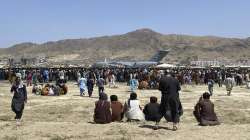Afghanistan: Millions of Afghans internally displaced amid growing humanitarian crisis
The regime change has severely affected the private sector as a large majority of local enterprises and international organizations remain closed since the Taliban's takeover.

After the Taliban took control of Afghanistan in mid-August, millions of Afghans have been internally displaced, and thousands have left the country giving rise to a growing humanitarian crisis.
Scores of local families have left their homes and livestock behind in Daikondi, Panjshir, Helmand, and other provinces due to the uncertain and chaotic economic and political situation, reported Khaama Press.
The regime change has severely affected the private sector as a large majority of local enterprises and international organizations remain closed since the Taliban's takeover. This translates that the country is in a dire economic situation with no international support and connectivity, resulting in an extremely difficult situation for ordinary people.
Similarly, the public sector has been partially paralyzed due to the absence of trade and regional connectivity. Afghan traders face unnecessary delays in reaching agriculture products to the regional markets due to several reasons. Likewise, importing basic necessity and food items have become challenging resulting in increased prices during these difficult times, reported Khaama Press.
Afghanistan's fragile and donation-based economy has already collapsed since the international community ceased sending funds, and the new regime has yet to gain international recognition and support. Many privately-owned companies and businesses remain closed and have yet to become operational due to the overwhelming uncertainties.
The war is over, and the security situation has improved, however, security alone does not help the economy to thrive.International connectivity, regional trade, and foreign investment play a critical role in any economy, which are still missing in the context of Afghanistan, reported Khaama Press.
Hopelessness, uncertainty, and desperation have overwhelmed people as they fear facing the worst scenarios as starvation has already hit the country due to unemployment, internal displacement, COVID-19, and drought.
On the other hand, neighbouring countries, including Iran, Pakistan, and Tajikistan, have closed their land borders to avoid a further influx of Afghan refugees, reported Khaama Press. Unemployment, starvation, migration, displacement are major challenges Afghan people are plagued with the current circumstances, marking the beginning of a new humanitarian crisis.
Apparently, it is beyond the Kabul regime's ability to come up with comprehensive solutions to the existing problems, unless regional and international countries extend their helping hands to the needy people of Afghanistan who have been suffering from dire poverty, migration, and instability for nearly half a century, reported Khaama Press.
(With ANI inputs)